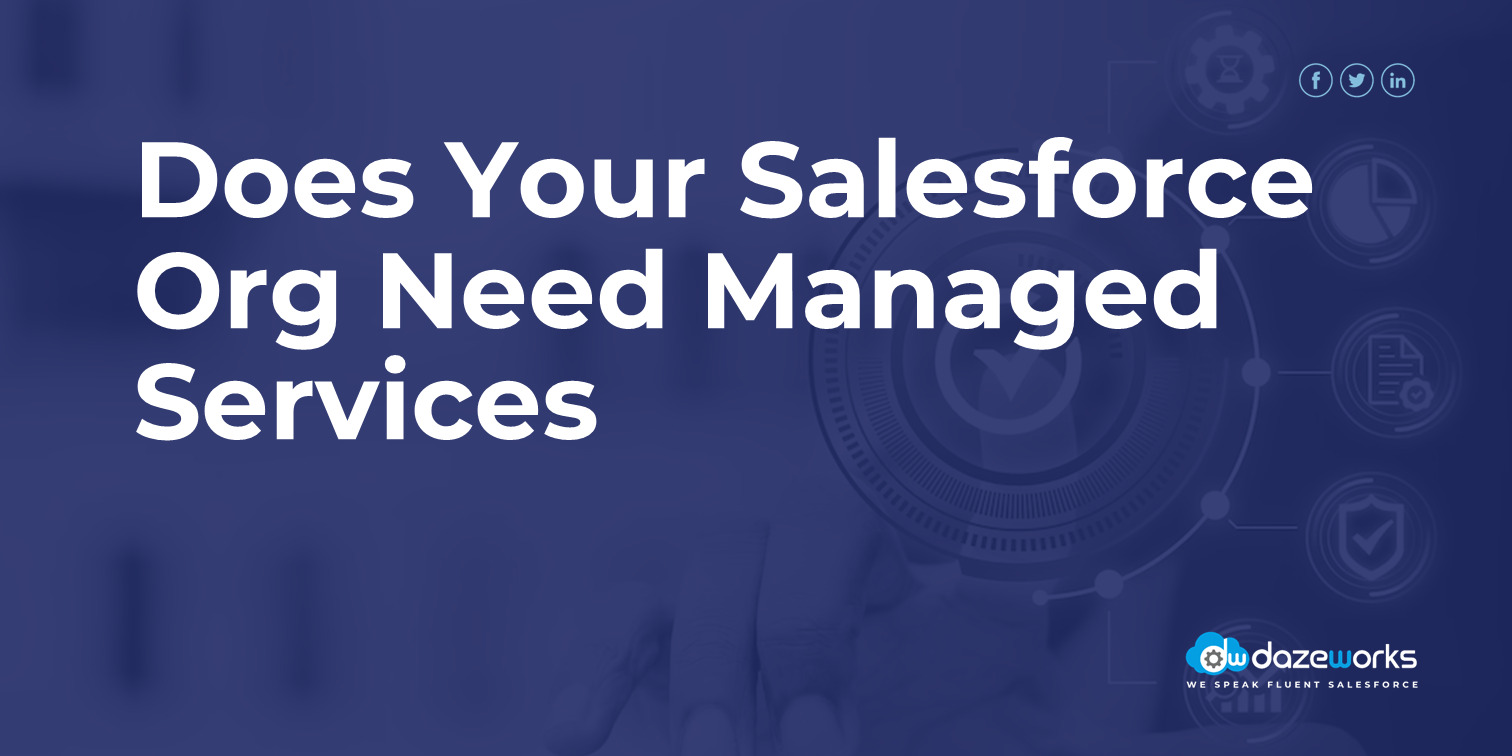
Does your Salesforce org Need Managed Services?
minutes read
From optimizing performance to ensuring seamless integrations and driving user adoption, managing a Salesforce org comes with its fair share of challenges. But how do you know when it’s time to seek external support? In this blog, we explore the key indicators that suggest your Salesforce org could greatly benefit from the expertise and assistance of a managed services provider. But before we get started, let’s understand what Salesforce managed services entail.

An Introduction to Salesforce Managed Services
Salesforce managed services typically include a range of services and support to ensure the smooth operation and optimization of your Salesforce org. While the specific offerings may vary depending on the provider, here are some common elements included in Salesforce managed services:
Administration and Configuration
Managed services providers assist with day-to-day administration tasks, such as user management, security setup, object and field configuration, workflow rules, and approval processes.
System Maintenance and Health Checks
Regular system maintenance is performed to ensure optimal performance, including monitoring and resolving system errors, data cleanup, and conducting health checks to identify and address any issues proactively.
Enhancements and Customization
Managed services providers help with the customization and enhancement of your Salesforce org, tailoring it to your unique business requirements. This may include developing custom objects, fields, page layouts, and automating processes with workflows, triggers, and Lightning Flow.
Integrations and Data Management
Managed services assist in integrating Salesforce with other applications in your tech stack, ensuring seamless data flow and synchronization. They also help with data management tasks like data imports, exports, deduplication, and data cleansing.
User Training and Adoption
To maximize user adoption and productivity, managed services providers offer user training sessions and documentation to help your team fully utilize Salesforce’s features and functionalities.
Release Management and Upgrades
Managed services providers stay up to date with the latest Salesforce releases and handle the process of upgrading your org. They ensure compatibility, test customizations, and implement new features to take advantage of the platform’s advancements.
Support and Issue Resolution
Managed services include ongoing support, where experts are available to address your questions, troubleshoot issues, and provide guidance on best practices. They also assist in resolving technical issues and identifying root causes of problems.
Performance Monitoring and Optimization
Managed services providers monitor your Salesforce org’s performance, identifying areas for optimization and efficiency improvement. They make recommendations to enhance performance, scalability, and overall user experience.
Compliance and Security
Managed services can help establish and maintain compliance with data protection regulations, implement security measures, and address vulnerabilities to protect your org and data.
Key Indicators that Your Salesforce Org Needs Managed Services
Limited Internal Resources
If your team lacks the expertise, bandwidth, or time to effectively manage and optimize your Salesforce org, managed services can provide the additional support and resources you need.
Performance Issues
Are you experiencing slow load times, system crashes, or other performance-related issues? Managed services can help identify the root causes, optimize your org’s performance, and ensure it runs smoothly.
Incomplete or Outdated Configurations
If your Salesforce org has incomplete or outdated configurations that prevent you from leveraging its full potential, managed services can help you streamline and enhance your system, tailoring it to your unique business requirements.
Low User Adoption
If your users are struggling with adoption or are not utilizing Salesforce to its fullest extent, managed services can offer user training, support, and guidance to enhance user adoption and boost productivity.
Integration Challenges
In case you’re facing difficulties integrating Salesforce with other systems or tools within your tech stack, Managed services can provide the expertise to overcome integration challenges, ensuring seamless data flow and process automation.
Limited Salesforce Knowledge
If your team lacks in-depth knowledge of Salesforce features, functionalities, and best practices, managed services can provide access to experienced Salesforce professionals who can guide you through the platform’s complexities.
Compliance and Security Concerns
If you’re dealing with compliance requirements or data security concerns, managed services can help you establish robust security measures, maintain compliance, and address any potential vulnerabilities.
By leveraging Salesforce managed services, organizations can offload administrative tasks, tap into specialized expertise, and ensure their Salesforce org is well-maintained, efficient, and aligned with business objectives. If any of these signs resonate with your Salesforce org, it’s worth considering managed services as a way to optimize your system, improve user experience, and drive business growth.
